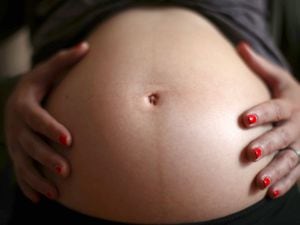More women than men aged 20-39 admitted to hospital with Covid-19 – study
Documents released by Sage also suggests maternal mortality rates in the UK have increased during the pandemic.

There were more women than men in the 20-39 age group admitted to hospital with Covid-19, according to documents from scientists advising the Government.
In a set of papers published by Scientific Advisory Group for Emergencies (Sage) on Friday, the experts said this increase in the number of women in hospital could be attributed to a lower threshold for admission when testing positive for Covid-19, as well as labour and birth and pregnancy-related complications.
The scientists, who included experts from the universities of Oxford, Edinburgh and Liverpool, also said maternal mortality rates in the UK have increased during the pandemic, although they stressed that Covid-19 may not be the sole reason.
They added that the mortality rates for mothers-to-be for March 2020-February 2021 may be at least 20% higher than in previous recent years (12 per 100,000 maternities compared to 10 per 100,000).
These include indirect deaths, due to women delaying going to the hospital or concealing pregnancy.
A document compiled using the UK Obstetric Surveillance System (UKOSS) – which enables national observational studies of pregnancy complications – said: “More cases with concerns over care have been escalated in the past year compared to the total escalated in the previous 10 years.
“(This) includes three deaths at home in women in late pregnancy who had not booked for antenatal care.
“At least two of these women’s deaths were indirectly related to the pandemic.”
However, the scientists also noted that in absolute terms, pregnant women admitted to hospital with symptomatic Covid-19 were not at greater risk of adverse outcome.
This was in part because mothers-to-be had a lower threshold for admission.
They said: “Pregnant females have a shorter length of stay in hospital than those who are not pregnant, even when excluding asymptomatic pregnant women.
“This suggests that there is a lower threshold for admission of pregnant women regardless of symptom status.”
Older women as well as women from Black, Asian or other minority ethnic groups, had a higher likelihood of hospital admission.
Underlying health conditions such as obesity, high blood pressure, diabetes and asthma were associated with increased risk of admission.
The experts also said that pregnant women admitted to hospital during the period when the B117 (UK) variant became predominant were significantly more likely to require respiratory support.
But they added that pregnant women showing symptoms of Covid-19 often did not receive treatments or were only provided with critical care when the disease had progressed further.
The scientists said: “Covid-specific medical therapies were used infrequently, even for women who were critically ill.”
Of the symptomatic pregnant women admitted to hospital with Covid-19, 10% received critical care and 1% died while 18% had a pre-term birth, which is about 2.5 times the background rate.
Although 3% of symptomatic pregnant women admitted to hospital took part in a Covid-19 clinical trial called Recovery, the experts said that overall, recruitment to therapeutic clinical trials remains low.
The document said: “We have no data on long-term direct or indirect effects of Covid-19 for pregnant women or their children.
“Lack of research on vaccines in pregnancy means that most pregnant women are likely to remain unvaccinated (and hence vulnerable) when all other adults (and children) have been offered vaccination.”
It added: “It would be useful to have systematic evidence on vaccination and pregnancy collected and analysed and when it exists from clinical trials for this to be presented at the earliest opportunity.”
Nearly a million women in the UK are pregnant each year, of whom 700,000 give birth – 96% of which were in hospital settings.





